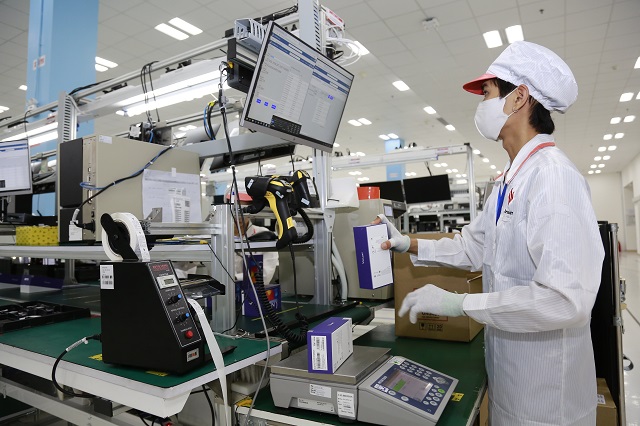Vietnam – bright spot in gloomy global economic picture: ASEAN Today
Vietnam’s top leaders, who are selected at the 13th National Congress of the Communist Party, will drive the country towards its socio-economic development targets as well as multilateral goals around peace, security and prosperity in the region and globally.
Since the outbreak of Covid-19, Vietnam has become a bright spot, a model for successfully containing the pandemic and maintaining positive economic growth of nearly 3% in 2020, according to a recent article published on the ASEAN Today.
| Vietnam has become a bright spot in gloomy global economic picture. Photo: Thanh Hai. |
The article cited opinions from foreign organizations and experts as saying amid global and regional crises sparked by Covid-19, natural disasters and geopolitical changes, Vietnam has continued to show marked success in the fight against the pandemic and in economic growth, mainly due to strong political will and drastic measures by government and citizens.
“The country’s upcoming leadership, after the 13th National Congress of the Communist Party, will bring further developments,” it noted.
As the global crisis stretches into its second year, Vietnam continues efforts to research, produce and conduct clinical trials for Covid-19 vaccines, noted ASEAN Today.
Last June, the International Monetary Fund (IMF) published a report titled “Vietnam’s Success in Containing Covid-19 Offers Roadmap for Other Developing Countries”, lauding Vietnam for having rapidly introduced containment, taken aggressive and cost-effective control measures and launched a whole-of-society fight.
On August 29, 2020, United Nations (UN) News released an article entitled “The Key to Vietnam’s Successful Covid-19 Response”, by Kamal Malhotra, the UN resident coordinator in Vietnam.
“Vietnam’s success has drawn international attention because of its early, proactive, response, led by the government, and involving the whole political system, and all aspects of the society,” Malhotra wrote.
“Notably, the Vietnamese public had been exceptionally compliant with government directives and advice, partly as a result of trust built up thanks to real time, transparent communication from the Ministry of Health, supported by the WHO and other UN agencies. Innovative methods were used to keep the public informed and safe. For instance, regular text updates were sent by the Ministry of Health, on preventive measures and Covid-19’s symptoms,” Malhotra added.
Growing status in global stage
In addition to successfully containing Covid-19, Vietnam has seen multilateral diplomacy milestones in the past year, including through its role as ASEAN Chair for 2020, a non-permanent member of the UN Security Council for 2020-21, and Chair of the 41st General Assembly of the ASEAN Inter-Parliamentary Assembly (AIPA).
Amid the COVID-19 pandemic, Vietnam convened ASEAN meetings online and launched 13 initiatives at ASEAN events. At the ASEAN Summit 2020, the regional bloc adopted a record number of agreements and resolutions—including the Regional Comprehensive Economic Partnership (RCEP), a free trade agreement between Asia-Pacific nations and the world’s largest trade deal.
Vietnam also strove for global cooperation through the first-ever UN Security Council meeting on ASEAN-UN cooperation and the International Day of Epidemic Preparedness (December 27).
Cooperation between ASEAN and the UN on international peace and security was a key theme throughout Vietnam’s term as ASEAN chair, beginning with the UN Security Council meeting on January 30, 2020.
Carl Thayer, professor emeritus and a Southeast Asia specialist at the University of New South Wales in Australia, has noted how Vietnam’s response to the pandemic has increased its standing regionally and globally.
Thayer and other analysts have lauded Vietnam’s recent role on the UN Security Council, including its support for expanding coordination between ASEAN, the Security Council and other UN bodies, as well as pushing for global adherence to international law and the UN Charter.
Positive economic growth
In 2020, Vietnam was one of the few countries in the world that posted positive economic growth. According to Vietnam’s General Statistics Office, the country’s GDP expanded by 2.91%, with its all-time high trade surplus of nearly US$19.1 billion for 2020.
Reuters and Singapore’s Business Times wrote that strict quarantine and tracing measures helped Vietnam to quickly curb outbreaks and recover economically faster than many Asian countries.
Indonesian Finance Minister Sri Mulyani Indrawati said that Vietnam is one of the two countries (the other being China) to record positive economic growth amid the Covid-19 pandemic.
Besides economic growth, Vietnam has also shown progress in technology and education through the pandemic. In 2020, Vietnam made advancements in developing 5G networks, using equipment manufactured by local industry and telecoms group Viettel. Meanwhile, Vietnamese students succeed in global academic competitions despite the impacts of the pandemic.
The Communist Party of Vietnam is set to convene its 13th National Congress from January 25 to February 2, as well as sessions of the National Assembly, to select upcoming leadership.
“With the country coming off of a strong year in 2020, the country’s next administration will likely continue to steer the country towards its socio-economic development targets as well as multilateral goals around peace, security and prosperity in the region and globally,” stated ASEAN Today.













